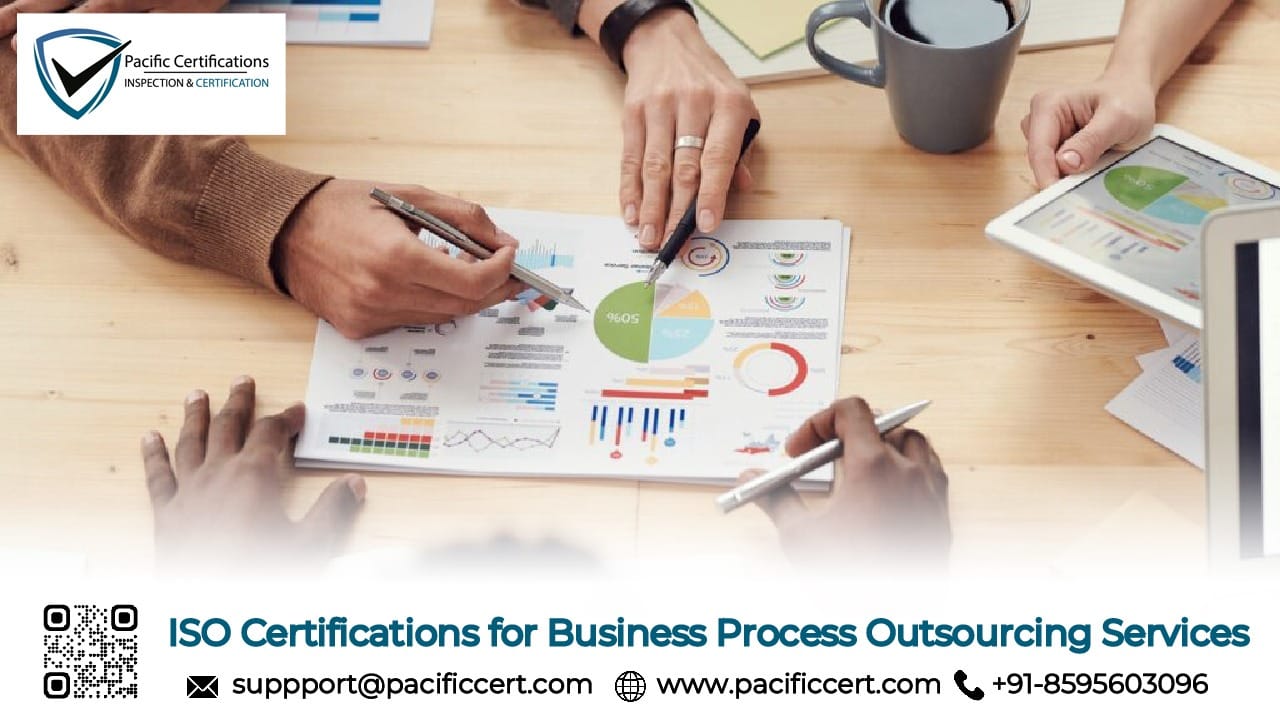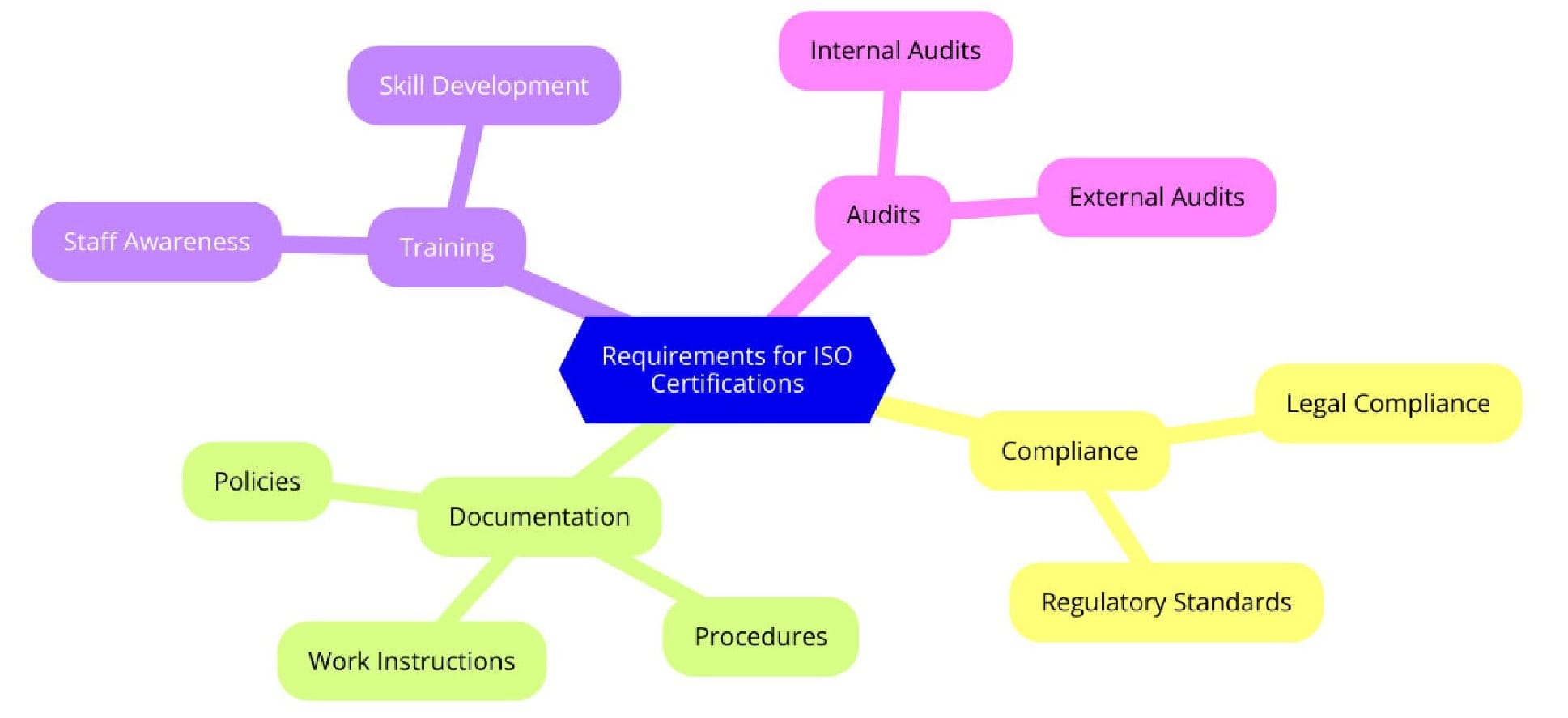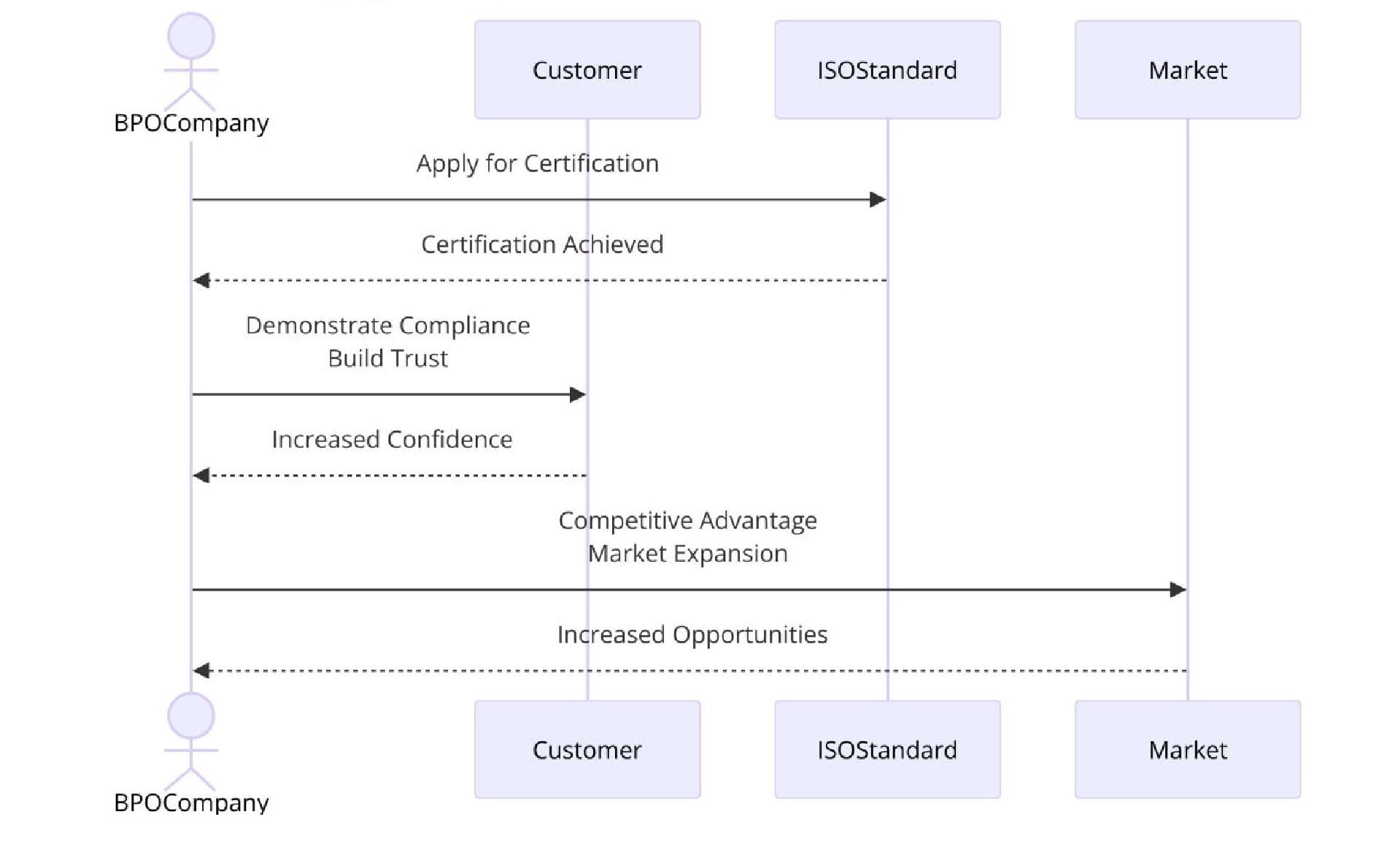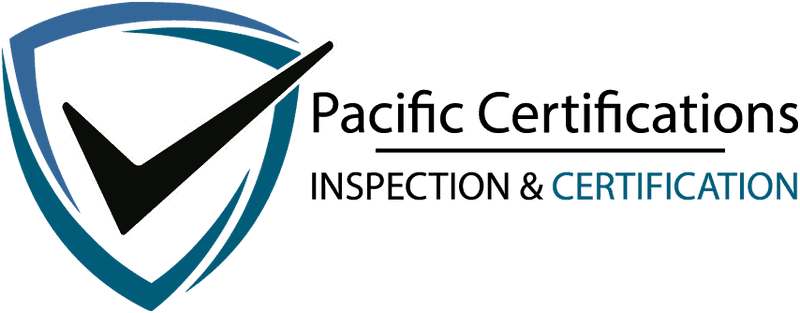ISO Certifications for Business Process Outsourcing Services Businesses, Requirements and Benefits

ISO Certifications for Business Process Outsourcing Services
In the rapidly growing and competitive industry of Business Process Outsourcing (BPO), maintaining consistency and customer satisfaction is more critical than ever. BPO companies often act as the backbone of business operations for organizations across the globe. Whether it's customer service, finance, IT support, or human resources, outsourcing services need to be delivered with the utmost precision and reliability. One way to demonstrate this commitment to excellence is through ISO certifications.
ISO standards are internationally recognized benchmarks that outline best practices for organizations to deliver consistent and quality-focused services. For Business Process Outsourcing Services, ISO standards help ensure seamless service delivery, data security & client satisfaction.

The BPO industry thrives on trust. Organizations that outsource critical business operations need assurance that their service provider is capable of handling processes efficiently and securely. ISO certifications act as proof of that capability, giving BPO companies an edge over competitors.
Over the years, ISO standards have evolved to cater to the unique challenges and risks of outsourcing services, such as managing sensitive customer data, maintaining service quality, and adhering to compliance requirements across different countries. Adopting these standards isn’t just a regulatory formality—it’s a strategic move that aligns your business with international best practices.
If you’re seeking ISO certification for your Business Process Outsourcing (BPO) services, reach out to us today at [email protected] or call +91-8595603096. We’re here to assist you in achieving global recognition!
Applicable ISO Standards for Business Process Outsourcing Services
There are several ISO standards relevant to the BPO industry. These certifications focus on areas such as quality management, information security, business continuity, and more. Here are the key ISO standards that apply to Business Process Outsourcing Services:
ISO 9001: Quality Management System
ISO 9001 is one of the most widely adopted standards, providing a framework for organizations to implement effective quality management systems (QMS). It ensures that services meet customer expectations and comply with legal and regulatory requirements.
For BPO providers, ISO 9001 certification enhances process efficiency, reduces errors, and improves client satisfaction by focusing on continuous improvement.
ISO 18295-1:2017 Customer Contact Centres —Requirements for customer contact centers
This standard specifies the service requirements for customer contact centers (CCCs) to consistently deliver high-quality customer interactions. It includes provisions for:
- Customer engagement and satisfaction.
- The availability of services.
- Consistent communication methods and channels.
- Competence and training of customer service representatives.
- Handling complaints effectively.
ISO/IEC 27001: Information Security Management System
Data security is a top priority for BPO companies, as they handle sensitive customer information on behalf of their clients. ISO/IEC 27001 outlines best practices for establishing and maintaining an Information Security Management System (ISMS).
By obtaining this certification, BPO companies can demonstrate their commitment to protecting confidential data, mitigating risks, and adhering to privacy regulations like GDPR or HIPAA.
ISO 22301: Business Continuity Management System
Business disruptions can occur due to natural disasters, cyberattacks, or unexpected crises. ISO 22301 helps organizations implement a Business Continuity Management System (BCMS) to minimize the impact of such disruptions and ensure the continuity of operations.
ISO 20000-1: IT Service Management
For BPO companies involved in IT services, ISO 20000-1 provides a framework to improve IT service delivery, enhance customer satisfaction, and align IT processes with business objectives.
Risk management is essential for BPO companies operating in complex, high-stakes environments. ISO 31000 provides guidelines to identify, assess, and mitigate risks effectively, ensuring a proactive approach to challenges.
ISO 10002: Customer Satisfaction and Complaint Handling
Customer satisfaction is at the core of every successful BPO operation. ISO 10002 focuses on complaint management systems, providing a structured approach to resolving customer grievances and enhancing satisfaction levels.
Click here to find out more applicable standards to your industry
At Pacific Certifications, we specialize in auditing and issuing ISO certifications to help BPO companies meet international standards. Our certification services ensure that your organization is aligned with global best practices, enhancing operational efficiency, trust, and competitiveness.
As an independent certification body, we bring extensive expertise and integrity to the table, offering impartial evaluations and certifications that strengthen your organization’s credibility. Whether you're seeking certification for ISO 9001, ISO/IEC 27001, or any other standard, Pacific Certifications is your trusted partner.
For ISO certifications that enhance your BPO services’ credibility and quality, contact us at [email protected] or dial +91-8595603096. Let’s get started today!
Requirements of ISO Certifications for Business Process Outsourcing Services
When pursuing ISO certifications, each standard comes with its own set of specific requirements tailored to address unique aspects of business operations. Below, we break down the key requirements of each applicable ISO standard for Business Process Outsourcing (BPO) services:

ISO 9001: Quality Management System (QMS)
- Establishment of a Quality Policy: Develop a documented quality policy aligned with the organization's objectives and customer needs.
- Customer Focus: Understand and meet customer requirements to enhance satisfaction.
- Process Approach: Identify, map, and manage interrelated processes to ensure seamless workflows.
- Risk and Opportunity Management: Identify risks and opportunities that could impact service quality and take actions to address them.
- Leadership Involvement: Ensure active engagement of top management in the QMS and quality improvement initiatives.
- Resource Management: Provide adequate resources, including trained personnel, technology, and infrastructure, to meet customer expectations.
- Monitoring and Measurement: Continuously monitor and measure processes to ensure effectiveness and compliance.
- Internal Audits: Conduct regular internal audits to assess the QMS performance and identify improvement opportunities.
- Corrective Actions: Address and resolve nonconformities in processes or services effectively.
ISO 18295-1:2017 Customer Contact Centres
Customer Experience Focus
- Understand and monitor customer satisfaction and expectations.
- Ensure consistent and high-quality customer interactions.
Service Delivery
- Define and meet agreed service levels (e.g., response times, resolution rates).
- Provide accurate, clear, and accessible information to customers.
Communication Channels
- Offer multiple communication options (e.g., phone, email, chat) to meet customer needs.
- Ensure consistency and reliability across all channels.
Customer Rights and Expectations
- Protect customer data and privacy.
- Clearly communicate customer rights and escalation processes.
Competence and Training
- Ensure staff are adequately trained and qualified.
- Regularly assess and update staff skills based on performance and customer feedback.
Complaint Management
- Implement effective and transparent processes for handling complaints.
- Resolve complaints promptly and to the customer’s satisfaction.
Performance Monitoring and Reporting
- Measure and monitor key performance indicators (KPIs) related to customer satisfaction.
- Regularly review performance and implement improvements.
Accessibility and Availability
- Ensure services are accessible during advertised hours.
- Provide alternative options if service is unavailable.
ISO/IEC 27001: Information Security Management System (ISMS)
- Establishing an Information Security Policy: Define and document a policy for managing information security.
- Risk Assessment: Conduct a thorough risk assessment to identify potential vulnerabilities, threats, and their impact on data security.
- Implementation of Security Controls: Apply a set of security controls from Annex A of the standard (e.g., access control, encryption, backup policies).
- Statement of Applicability (SoA): Prepare an SoA detailing which security controls are applicable and why.
- Asset Management: Maintain an inventory of information assets and classify them based on their importance and sensitivity.
- Incident Management: Establish procedures to identify, report, and respond to security incidents effectively.
- Compliance Obligations: Ensure compliance with applicable legal, regulatory, and contractual requirements related to information security.
- Monitoring and Evaluation: Regularly monitor and evaluate the effectiveness of the ISMS and make necessary adjustments.
- Internal and External Audits: Perform audits to assess compliance with the standard and readiness for certification.
ISO 22301: Business Continuity Management System (BCMS)
- Business Continuity Policy: Define a policy to address potential disruptions and recovery strategies.
- Business Impact Analysis (BIA): Identify critical processes, assess potential risks, and evaluate their impact on operations.
- Risk Assessment: Analyze risks to business continuity and develop strategies to mitigate them.
- Incident Response Structure: Create a framework for responding to incidents effectively.
- Recovery Plans: Develop recovery plans for critical functions, including backup systems and alternative resources.
- Testing and Exercises: Regularly test the BCMS to ensure its effectiveness in real-world scenarios.
- Continual Improvement: Update and improve the business continuity plan based on test results, feedback, and changes in the business environment.
- Leadership and Commitment: Involve top management in promoting and maintaining the BCMS.
ISO 20000-1: IT Service Management
- Service Management Policy: Develop a policy outlining how IT services will be managed and delivered.
- Service Level Agreements (SLAs): Establish, monitor, and meet agreed service levels with clients.
- Incident and Problem Management: Define processes for handling IT incidents and identifying the root causes of recurring problems.
- Change Management: Implement controls to manage changes in IT infrastructure and services effectively.
- Configuration Management: Maintain an accurate and up-to-date configuration of IT assets.
- Capacity and Availability Management: Ensure IT systems have the capacity and availability to meet client demands.
- Continual Service Improvement: Use data-driven insights to enhance IT service quality over time.
- Audits and Compliance: Monitor compliance with IT service management policies and conduct periodic reviews.
General Documentation and Process Requirements for All Standards
Regardless of the specific ISO standard, BPO companies are generally required to:
- Develop policies and procedures tailored to the chosen standard(s).
- Document processes, roles, and responsibilities clearly.
- Provide training to employees to ensure compliance.
- Conduct internal audits to evaluate performance.
- Address nonconformities and implement corrective actions.
- Commit to continuous improvement through periodic reviews and updates.
By meeting these requirements, BPO providers can align with global best practices, enhance operational performance, and earn the trust of their clients.
Want to meet international standards for your BPO services? Email us at [email protected] or call +91-8595603096 to take the next step.
Benefits of ISO Certifications for Business Process Outsourcing Services
ISO certifications bring a multitude of benefits to BPO companies, helping them stay competitive and resilient in an ever-changing landscape.

Credibility: ISO certifications serve as a globally recognized seal of approval, boosting your company’s reputation and instilling trust in your clients.
Efficiency: By implementing ISO standards, BPO companies can streamline their processes, reduce waste, and improve overall efficiency.
Customer Satisfaction: Standards like ISO 9001 and ISO 10002 ensure that BPO services consistently meet or exceed client expectations, leading to higher satisfaction rates.
Data Security: With ISO/IEC 27001 certification, BPO providers can safeguard sensitive information, reduce data breaches, and comply with privacy regulations.
Business Continuity: ISO 22301 ensures that your business remains operational even in the face of disruptions, providing peace of mind to your clients.
Competitive Advantage: In a crowded marketplace, ISO certifications can differentiate your company from competitors, showcasing your commitment to quality and compliance.
The global BPO market is projected to grow at a compound annual growth rate (CAGR) of 8.5% between 2024 and 2030, according to industry research. This growth is driven by increasing demand for cost optimization, digital transformation, and enhanced customer experiences.
ISO certifications are playing a crucial role in this evolution, as more BPO companies recognize the need to align with global standards to attract international clients. Data security, in particular, has emerged as a top priority, with certifications like ISO/IEC 27001 becoming a non-negotiable requirement for many clients.
Don’t wait—secure your place as a trusted and reliable BPO provider with ISO certifications!
Pacific Certifications is accredited by ABIS, in case you need support with ISO certification for your Business Process Outsourcing Services business, please contact us at [email protected] or +91-8595603096.
FAQs: ISO Certifications for Business Process Outsourcing Services
What is the importance of ISO certifications for BPO services?
ISO certifications ensure that BPO companies adhere to global standards for quality, data security, and business continuity, enhancing credibility and customer trust.
How does ISO/IEC 27001 benefit BPO companies?
ISO/IEC 27001 helps BPO providers implement robust information security measures, protecting sensitive customer data and reducing the risk of data breaches.
What are the steps to achieve ISO certification?
The process involves identifying applicable standards, preparing documentation, implementing required processes, conducting internal audits, and undergoing an external audit by a certification body like Pacific Certifications.
Can ISO certifications improve customer satisfaction in BPO services?
Yes, standards like ISO 9001 and ISO 10002 focus on quality management and customer satisfaction, ensuring that services meet or exceed client expectations.
Are ISO certifications mandatory for BPO companies?
While not mandatory, ISO certifications are increasingly becoming a standard requirement for BPO companies to remain competitive and compliant in the global market.
How can Pacific Certifications help with ISO certifications?
Pacific Certifications specializes in auditing and issuing ISO certifications, helping BPO companies align with international standards and achieve their business goals.
Read More at: Blogs by Pacific Certifications

